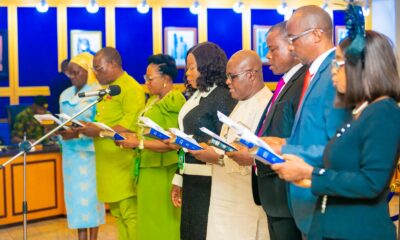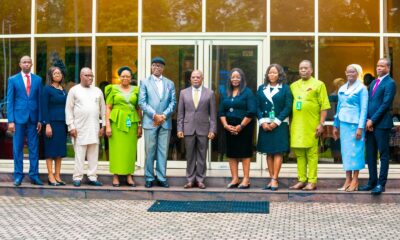Featured
Don’t Borrow Money Without Approval, Wike Warns New LG Chairmen
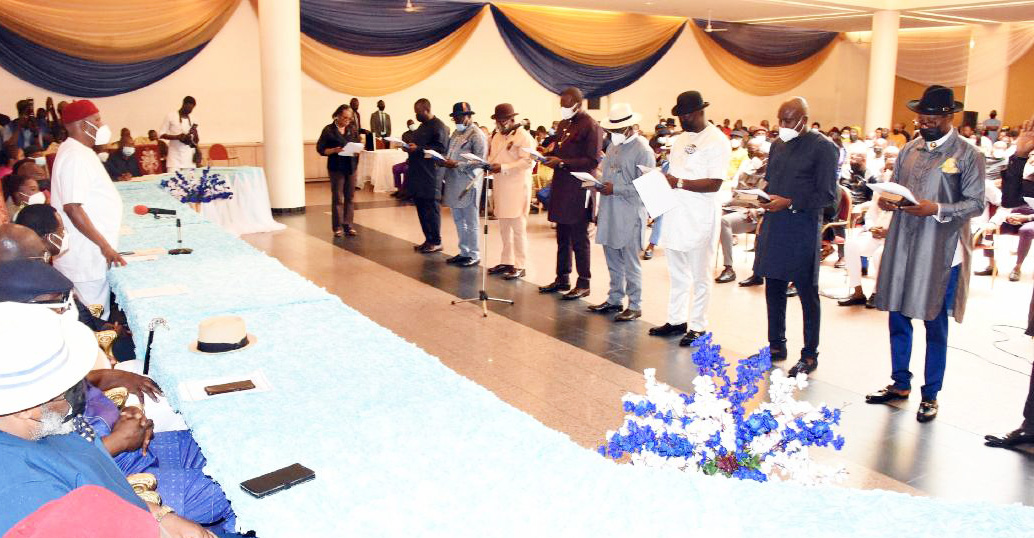
The Rivers State Governor, Chief Nyesom Wike, has told newly sworn-in chairmen of the 23 local government areas of the state not to approach any financial institution to borrow money without first clearing with the state government.
The governor gave the warning shortly after the elected chairmen of the 23 LGAs took their oath of office at the Banquet Hall of Government House, Port Harcourt, yesterday.
According to Wike, the caution has become necessary in order to stem unguarded desire of some council chairman to access money without any development plan.
“Don’t go and borrow money without the state government approval. Some of you tried it last time and started with your blackmail, saying help us, we are finished. You have no authority to go and borrow money. Even we as state government, before we go and borrow money we get approval from the Debt Management Office. No bank will even give us.
“Before you borrow money, the state must know what you want to use it for, and how you will pay it back, so that others who are coming will not suffer because of your indebtedness.”
Wike also charged the council chairmen to pay proper attention to issues of security in order to stem likely security breaches in their various councils.
The governor particularly urged them to establish a robust working relationship both with the Divisional Police Officers (DPOs) and the traditional rulers that will engender having regular security meetings for proper briefings.
“Stay in your council areas. Don’t stay in hotels and in Port Harcourt. If you’re not at home, how do you know about the security situation in your local government? Security is key!
“Relate with your DPOs. It does not cost you anything. Even if it cost you, governance is not easy. Governance is expensive. Security is expensive. Some of you cannot relate with the DPOs.
“It’s only when you have a problem that you relate with your DPOs and some of them are intelligent and when you call them that time, they turn their face the other way. You must make effort to relate with your DPOs.”
The governor urged the council chairmen to ensure they hold Security Council meeting weekly or better still, once in every two weeks for proper briefing.
Speaking further, Wike warned them against embarking on needless travel outside of the state and the country without notifying the state government.
He also encouraged them to work to strengthen the unity of the party in their various councils, consult widely with the leaders over appointments, and on other issues that will give everybody a sense of belonging.
Wike frowned at the worsening sanitary conditions particularly in Obio/Akpor, Port Harcourt City, Eleme, Oyigbo LGAs, and charged the council chairmen to work assiduously to regularly evaluate refuse dumped on major roads in their councils.
The state governor revealed that the state government prevented the former chairmen whose tenure ended, last Wednesday, from paying local government workers salary due to security report and complains by some councillors and political appointees that they will not be paid what was due them.
“So, I decided to suspend the payment of local government workers and political appointees, so that the newly sworn-in chairmen will have to pay them without any crisis whatsoever.”
He said the state government will set up a committee to oversee the payment of all entitlement of immediate past chairmen, their political appointees and councillors.
According to him, “All the former council chairmen, all political appointees and councillors must be paid their money.”
Wike said he has received intelligence report that some council chairmen have sworn that they will not swear in some elected councillors who they perceive to be opposed to them.
He warned that if this happens, appropriate sanction will be taken against the erring council chairmen.
The newly sworn-in chairmen are, Daniel E. O. Daniel (Abua/Odual); Benjamin Eke (Ahoada East); Hope Ikiriko (Ahoada West); Rowland Sekibo (Akuku-Toru); Barrister Awortu Erastus (Andoni); Onengiyeofori George (Asari-Toru); Irimagha David ( Bonny); Michael Williams (Degema); Obarilormate Ollor (Eleme); Dr. Lloyd Chidi (Emohua); Obinna Anyanwu (Etche); Deko Confidence (Gokana); and Engr Nwanosike Samuel (Ikwerre).
Others include, Bariere Thomas (Khana); Barrister Ariolu George (Obio/Akpor); Nemieboka Vincent (Ogu/Bolo); Akuro Tobin (Okrika); Nwaiwu Chisorom (Omuma); Vincent Job (Ogba/Egbema/Ndoni); Enyiada Cookey-Gam (Opobo/Nkoro); Nwaogu Akara (Oyigbo); Ihunda Allwell (Port Harcourt City); and Mbakpone Okpe (Tai).
Featured
Rivers A Strategic Hub for Nigeria’s Blue Economy -Ibas …Calls For Innovation-Driven Solutions
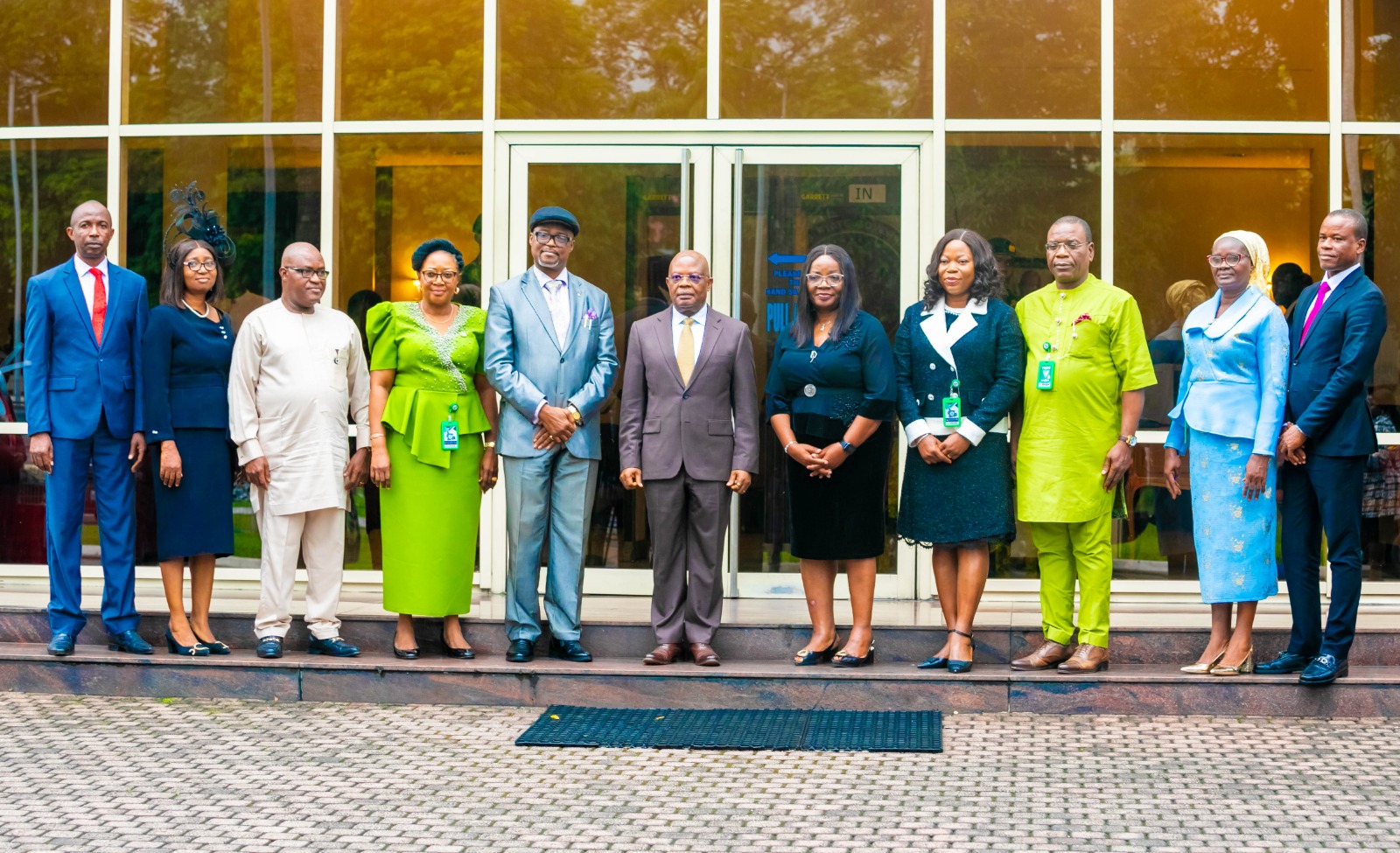
The Administrator of Rivers State, Vice Admiral (Rtd.) Ibok-Ete Ibas, has emphasized the need for innovation-driven strategies, strategic partnerships, and firm policy implementation to fully harness the vast potential of the blue economy.
Speaking during a courtesy visit by participants of Study Group 7 of the Executive Course 47 from the National Institute for Policy and Strategic Studies (NIPSS) at Government House, Port Harcourt, on Monday, Ibas highlighted the importance of diversifying Nigeria’s economy beyond oil by leveraging maritime resources to create jobs, enhance food security, strengthen climate resilience, and generate sustainable revenue.
The Administrator, according to a statement by his Senior Special Adviser on Media, Hector Igbikiowubo, noted that with coordinated efforts and innovative solutions, the blue economy could serve as a catalyst for inclusive growth, economic stability, and long-term environmental sustainability.
“It is estimated that a fully developed blue economy could generate over $296 million annually for Nigeria, spanning fisheries, shipping and logistics, marine tourism, offshore renewable energy, aquaculture, biotechnology, and coastal infrastructure,” he stated.
“We must transition from extractive practices to regenerative, inclusive, and innovation-driven solutions. This requires political cohesion, intergovernmental collaboration, robust infrastructure, and institutional capacity—all of which must be pursued with urgency and intentionality,” he added.
Ibas urged sub-national governments, particularly coastal states, to domesticate the national blue economy framework and develop tailored strategies that reflect their comparative advantages.
He stressed that such efforts must be guided by disciplined planning, regulation, and investment to maximize the sector’s potential.
Highlighting Rivers State’s pivotal role, the Administrator outlined its strategic advantages as follows:
•Nearly 30% of Nigeria’s total coastline (approximately 853km)
•Over 40% of Nigeria’s crude oil and gas output
•More than 33% of the country’s GDP and foreign exchange earnings
•416 of Nigeria’s 1,201 oil wells, many located in marine environments
•Two of Nigeria’s largest seaports, two oil refineries, and the Nigerian Liquefied Natural Gas (NLNG) terminal in Bonny Island—one of Africa’s most advanced gas facilities
Despite these opportunities, Ibas acknowledged challenges such as pollution, coastal erosion, illegal oil refining, unregulated fishing, inadequate infrastructure, and maritime insecurity.
He reaffirmed his administration’s commitment to institutional reforms, coastal zone management, and inter-agency collaboration to build a governance structure that supports a sustainable blue economy.
“Sustainability must be embedded in our development models from the outset, not as an afterthought. We are actively exploring partnerships in maritime education, aquaculture development, port modernization, and renewable ocean energy. We welcome knowledge-sharing engagements like this to refine our strategies and enhance implementation,” he said.
He urged the NIPSS delegation to ensure their findings translate into actionable recommendations that address the sector’s challenges.
Leader of the delegation, Vice Admiral A.A. Mustapha, explained that the visit aligns with their strategic institutional tour mandate on the 2025 theme: “Blue Economy and Sustainable Development in Nigeria: Issues, Challenges, and Opportunities.”
The group is engaging stakeholders to deepen understanding of policy efforts and institutional roles in advancing sustainable development through the blue economy.
Featured
INEC To Unveil New Party Registration Portal As Applications Hit 129

The Independent National Electoral Commission (INEC) has announced that it has now received a total of 129 applications from associations seeking registration as political parties.
The update was provided during the commission’s regular weekly meeting held in Abuja, yesterday.
According to a statement signed by the National Commissioner and Chairman of the Information and Voter Education Committee, Sam Olumekun, seven new applications were submitted within the past week, adding to the previous number.
“At its regular weekly meeting held today, Thursday 10th July 2025, the commission received a further update on additional requests from associations seeking registration as political parties.
“Since last week, seven more applications have been received, bringing the total number so far to 129. All the requests are being processed,” the commission stated.
The commission revealed the introduction of a new digital platform for political party registration. The platform is part of the Party Financial Reporting and Auditing System and aims to streamline the registration process.
Olumekun disclosed that final testing of the portal would be completed within the next week.
“INEC also plans to release comprehensive guidelines to help associations file their applications using the new system.
“Unlike the manual method used in previous registration, the Commission is introducing a political party registration portal, which is a module in our Party Financial Reporting and Auditing System.
“This will make the process faster and seamless. In the next week, the commission will conclude the final testing of the portal before deployment.
“Thereafter, the next step for associations that meet the requirements to proceed to the application stage will be announced. The commission will also issue guidelines to facilitate the filing of applications using the PFRAS,” the statement added.
In the meantime, the list of new associations that have submitted applications has been made available to the public on INEC’s website and other official platforms.
Featured
Tinubu Signs Four Tax Reform Bills Into Law …Says Nigeria Open For Business

President Bola Tinubu yesterday signed into law four tax reform bills aimed at transforming Nigeria’s fiscal and revenue framework.
The four bills include: the Nigeria Tax Bill, the Nigeria Tax Administration Bill, the Nigeria Revenue Service (Establishment) Bill, and the Joint Revenue Board (Establishment) Bill.
They were passed by the National Assembly after months of consultations with various interest groups and stakeholders.
The ceremony took place at the Presidential Villa, yesterday.
The ceremony was witnessed by the leadership of the National Assembly and some legislators, governors, ministers, and aides of the President.
The presidency had earlier stated that the laws would transform tax administration in the country, increase revenue generation, improve the business environment, and give a boost to domestic and foreign investments.
“When the new tax laws become operational, they are expected to significantly transform tax administration in the country, leading to increased revenue generation, improved business environment, and a boost in domestic and foreign investments,” Special Adviser to the President on Media, Bayo Onanuga said on Wednesday.
Before the signing of the four bills, President Tinubu had earlier yesterday, said the tax reform bills will reset Nigeria’s economic trajectory and simplify its complex fiscal landscape.
Announcing the development via his official X handle, yesterday, the President declared, “In a few hours, I will sign four landmark tax reform bills into law, ushering in a bold new era of economic governance in our country.”
Tinubu made a call to investors and citizens alike, saying, “Let the world know that Nigeria is open for business, and this time, everyone has a fair shot.”
He described the bills as not just technical adjustments but a direct intervention to ease burdens on struggling Nigerians.
“These reforms go beyond streamlining tax codes. They deliver the first major, pro-people tax cuts in a generation, targeted relief for low-income earners, small businesses, and families working hard to make ends meet,” Tinubu wrote.
According to the President, “They will unify our fragmented tax system, eliminate wasteful duplications, cut red tape, restore investor confidence, and entrench transparency and coordination at every level.”
He added that the long-standing burden of Nigeria’s tax structure had unfairly weighed down the vulnerable while enabling inefficiency.
The tax reforms, first introduced in October 2024, were part of Tinubu’s post-subsidy-removal recovery plan, aimed at expanding revenue without stifling productivity.
However, the bills faced turbulence at the National Assembly and amongst some state governors who rejected its passing in 2024.
At the NASS, the bills sparked heated debate, particularly around the revenue-sharing structure, which governors from the North opposed.
They warned that a shift toward derivation-based allocations, especially with VAT, could tilt fiscal balance in favour of southern states with stronger consumption bases.
After prolonged dialogue, the VAT rate remained at 7.5 per cent, and a new exemption was introduced to shield minimum wage earners from personal income tax.
By May 2025, the National Assembly passed the harmonised versions with broad support, driven in part by pressure from economic stakeholders and international observers who welcomed the clarity and efficiency the reforms promised.
In his tweet, Tinubu stressed that this is just the beginning of Nigeria’s tax evolution.
“We are laying the foundation for a tax regime that is fair, transparent, and fit for a modern, ambitious Nigeria.
“A tax regime that rewards enterprise, protects the vulnerable, and mobilises revenue without punishing productivity,” he stated.
He further acknowledged the contributions of the Presidential Fiscal Policy and Tax Reform Committee, the National Assembly, and Nigeria’s subnational governments.
The President added, “We are not just signing tax bills but rewriting the social contract.
“We are not there yet, but we are firmly on the road.”
-
Politics10 hours ago
Natasha’s Counsel Writes Senate Over Court Judgment
-
Nation10 hours ago
NIPR Practitioners Urge To Go Beyond Traditional Media Relations To Strategic Leadership Functions
-
Politics11 hours ago
Bayelsa APC Hails Late Buhari As Change Agent In Nigerian Politics
-
News8 hours ago
South-South contributes N34trn to Nigeria’s economy in 2024 – Institute
-
Niger Delta10 hours ago
Police Rescue Kidnap Victim, Recover Pistol In A’Ibom
-

 Politics9 hours ago
Politics9 hours agoINEC Trains Political Parties Officials On ICNP Use Ahead By-Elections
-
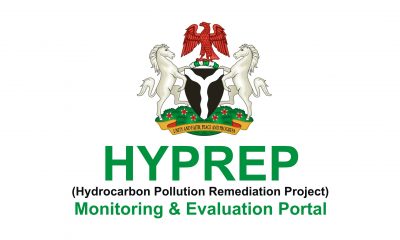
 Business11 hours ago
Business11 hours agoReplace Nipa Palms With Mangroove In Ogoni, Group Urges FG, HYPREP
-
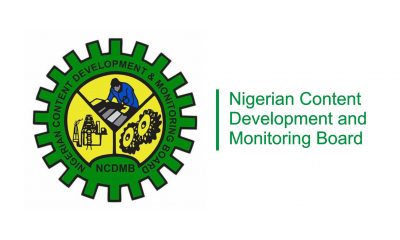
 Business8 hours ago
Business8 hours agoNCDMB, Dangote Refinery Unveil JTC On Deepening Local Content



